International Business Communications: Strategies for Succeeding in a Developing Country
VerifiedAdded on 2023/06/18
|10
|3173
|499
AI Summary
This report discusses communication strategies for succeeding in a developing country, using Sainsbury's expansion into Romania as an example. It covers theories of international communication, evaluation of cultural sensitivity, communication barriers, and recommendations for success.
Contribute Materials
Your contribution can guide someone’s learning journey. Share your
documents today.
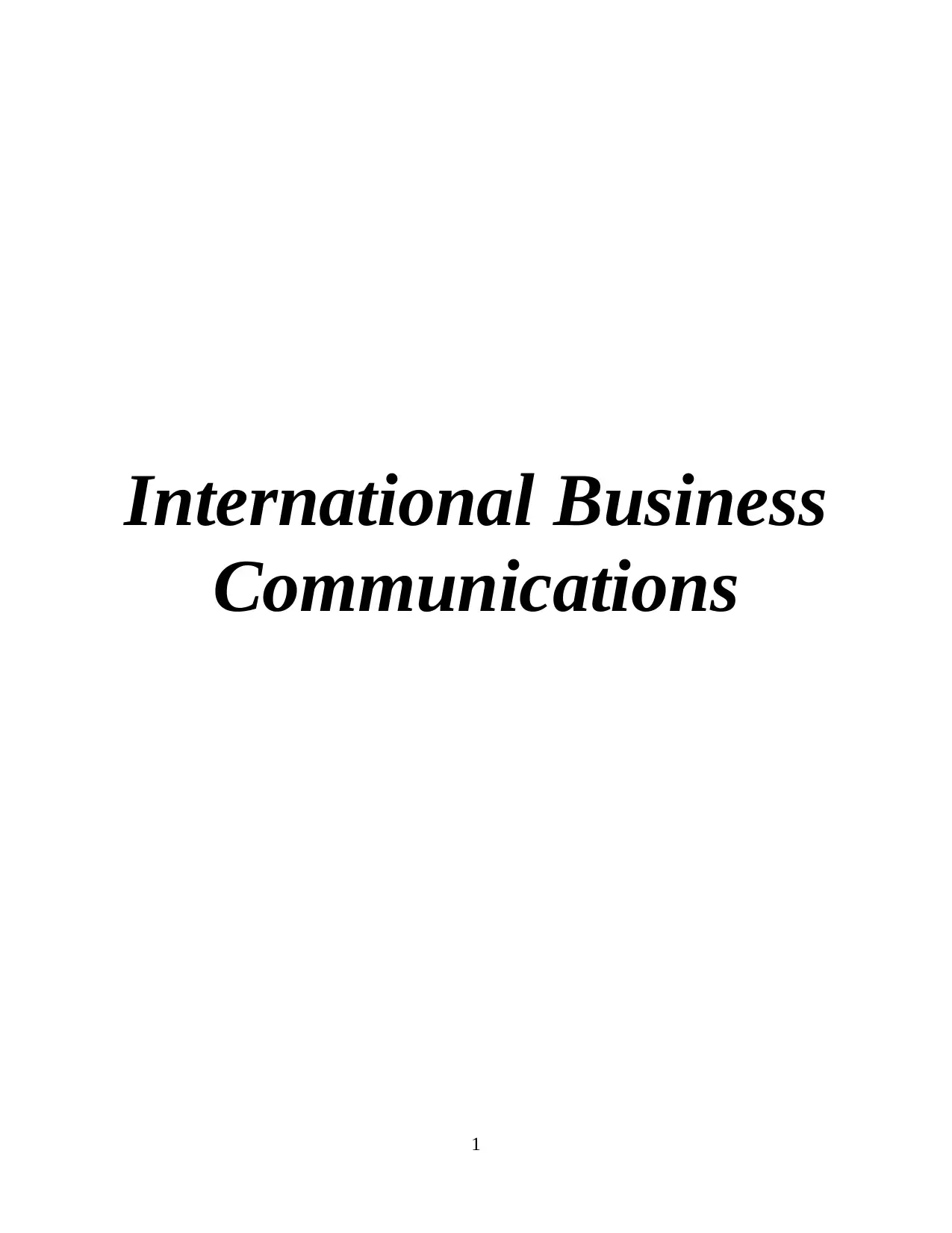
International Business
Communications
1
Communications
1
Secure Best Marks with AI Grader
Need help grading? Try our AI Grader for instant feedback on your assignments.
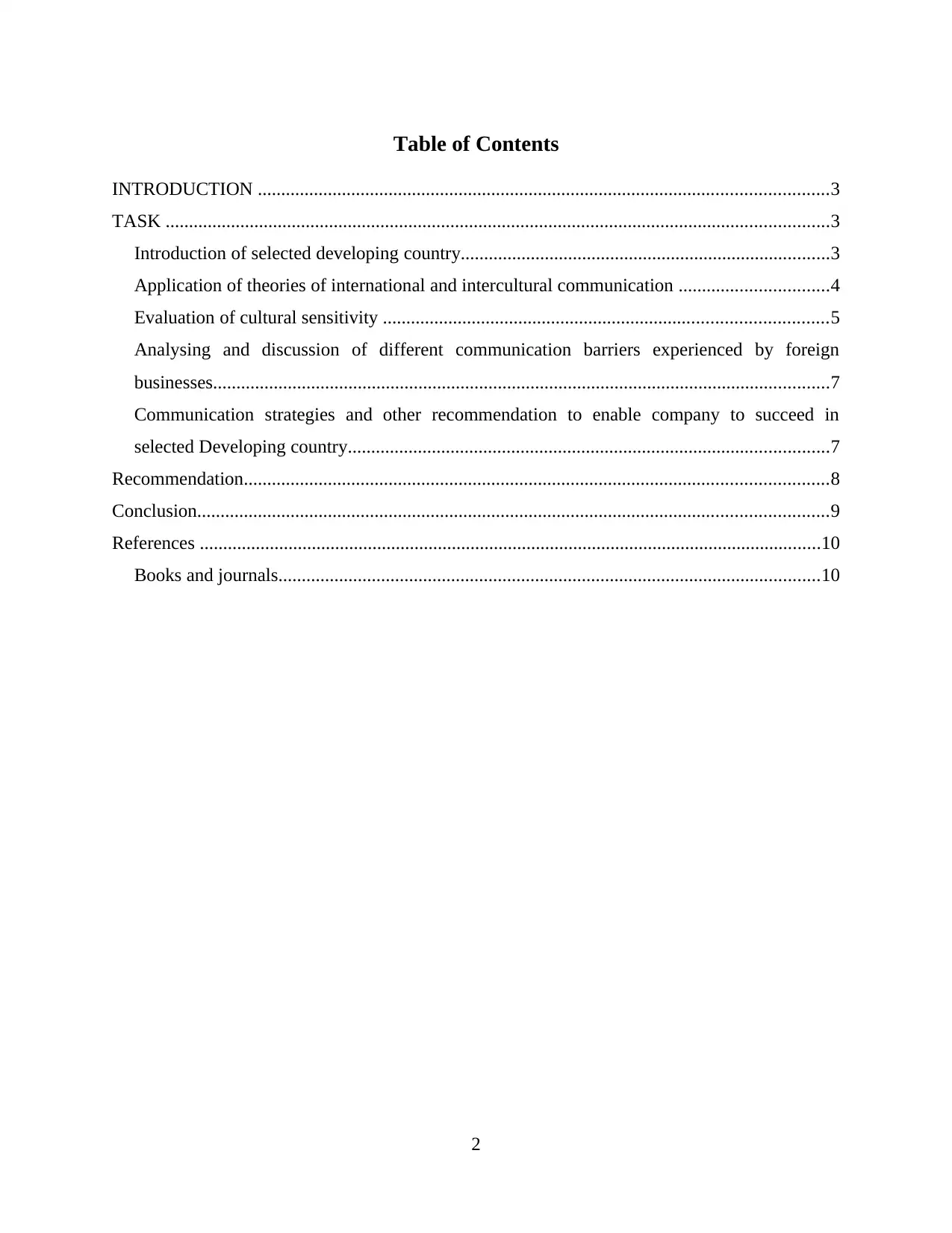
Table of Contents
INTRODUCTION ..........................................................................................................................3
TASK ..............................................................................................................................................3
Introduction of selected developing country...............................................................................3
Application of theories of international and intercultural communication ................................4
Evaluation of cultural sensitivity ...............................................................................................5
Analysing and discussion of different communication barriers experienced by foreign
businesses....................................................................................................................................7
Communication strategies and other recommendation to enable company to succeed in
selected Developing country.......................................................................................................7
Recommendation.............................................................................................................................8
Conclusion.......................................................................................................................................9
References .....................................................................................................................................10
Books and journals....................................................................................................................10
2
INTRODUCTION ..........................................................................................................................3
TASK ..............................................................................................................................................3
Introduction of selected developing country...............................................................................3
Application of theories of international and intercultural communication ................................4
Evaluation of cultural sensitivity ...............................................................................................5
Analysing and discussion of different communication barriers experienced by foreign
businesses....................................................................................................................................7
Communication strategies and other recommendation to enable company to succeed in
selected Developing country.......................................................................................................7
Recommendation.............................................................................................................................8
Conclusion.......................................................................................................................................9
References .....................................................................................................................................10
Books and journals....................................................................................................................10
2
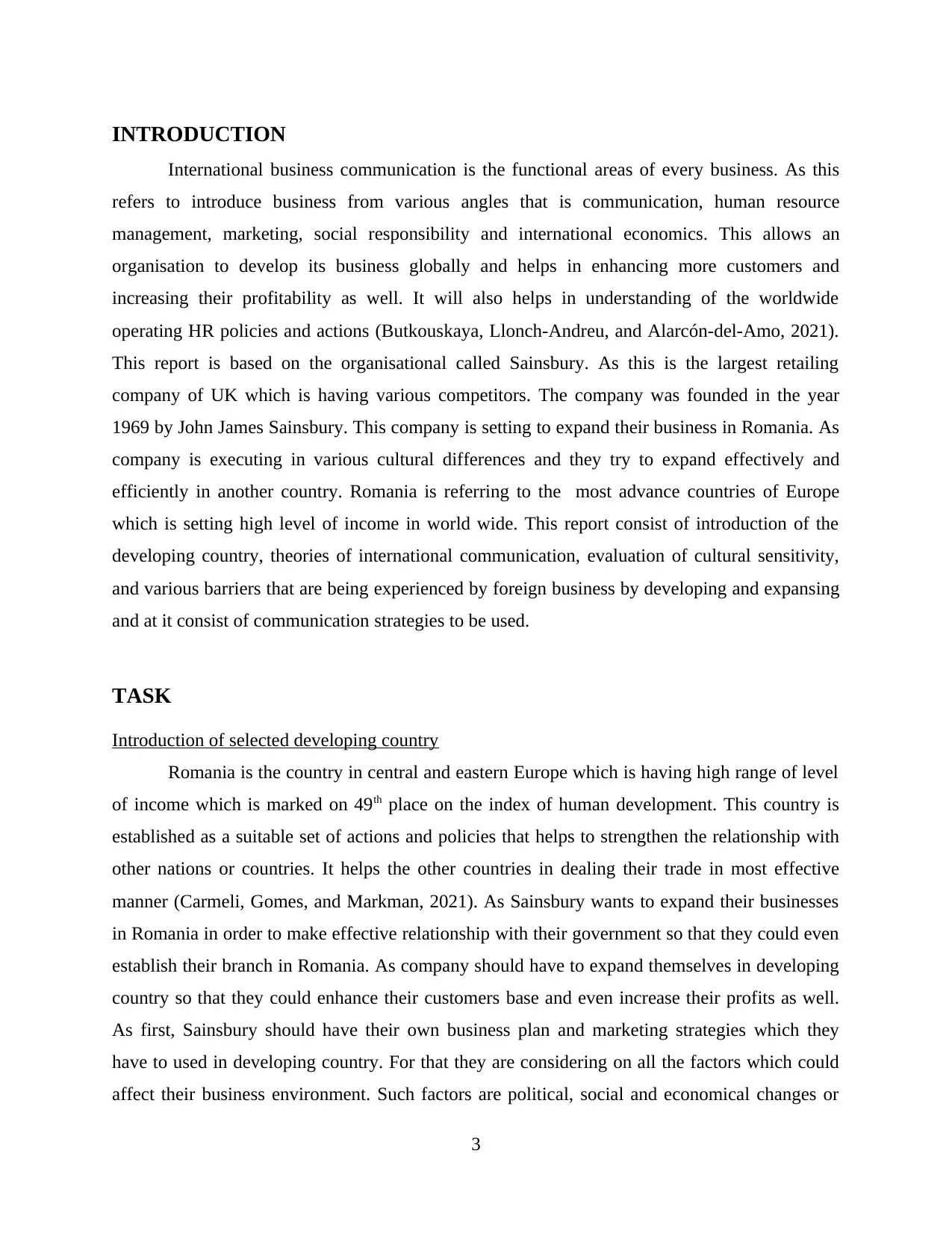
INTRODUCTION
International business communication is the functional areas of every business. As this
refers to introduce business from various angles that is communication, human resource
management, marketing, social responsibility and international economics. This allows an
organisation to develop its business globally and helps in enhancing more customers and
increasing their profitability as well. It will also helps in understanding of the worldwide
operating HR policies and actions (Butkouskaya, Llonch-Andreu, and Alarcón-del-Amo, 2021).
This report is based on the organisational called Sainsbury. As this is the largest retailing
company of UK which is having various competitors. The company was founded in the year
1969 by John James Sainsbury. This company is setting to expand their business in Romania. As
company is executing in various cultural differences and they try to expand effectively and
efficiently in another country. Romania is referring to the most advance countries of Europe
which is setting high level of income in world wide. This report consist of introduction of the
developing country, theories of international communication, evaluation of cultural sensitivity,
and various barriers that are being experienced by foreign business by developing and expansing
and at it consist of communication strategies to be used.
TASK
Introduction of selected developing country
Romania is the country in central and eastern Europe which is having high range of level
of income which is marked on 49th place on the index of human development. This country is
established as a suitable set of actions and policies that helps to strengthen the relationship with
other nations or countries. It helps the other countries in dealing their trade in most effective
manner (Carmeli, Gomes, and Markman, 2021). As Sainsbury wants to expand their businesses
in Romania in order to make effective relationship with their government so that they could even
establish their branch in Romania. As company should have to expand themselves in developing
country so that they could enhance their customers base and even increase their profits as well.
As first, Sainsbury should have their own business plan and marketing strategies which they
have to used in developing country. For that they are considering on all the factors which could
affect their business environment. Such factors are political, social and economical changes or
3
International business communication is the functional areas of every business. As this
refers to introduce business from various angles that is communication, human resource
management, marketing, social responsibility and international economics. This allows an
organisation to develop its business globally and helps in enhancing more customers and
increasing their profitability as well. It will also helps in understanding of the worldwide
operating HR policies and actions (Butkouskaya, Llonch-Andreu, and Alarcón-del-Amo, 2021).
This report is based on the organisational called Sainsbury. As this is the largest retailing
company of UK which is having various competitors. The company was founded in the year
1969 by John James Sainsbury. This company is setting to expand their business in Romania. As
company is executing in various cultural differences and they try to expand effectively and
efficiently in another country. Romania is referring to the most advance countries of Europe
which is setting high level of income in world wide. This report consist of introduction of the
developing country, theories of international communication, evaluation of cultural sensitivity,
and various barriers that are being experienced by foreign business by developing and expansing
and at it consist of communication strategies to be used.
TASK
Introduction of selected developing country
Romania is the country in central and eastern Europe which is having high range of level
of income which is marked on 49th place on the index of human development. This country is
established as a suitable set of actions and policies that helps to strengthen the relationship with
other nations or countries. It helps the other countries in dealing their trade in most effective
manner (Carmeli, Gomes, and Markman, 2021). As Sainsbury wants to expand their businesses
in Romania in order to make effective relationship with their government so that they could even
establish their branch in Romania. As company should have to expand themselves in developing
country so that they could enhance their customers base and even increase their profits as well.
As first, Sainsbury should have their own business plan and marketing strategies which they
have to used in developing country. For that they are considering on all the factors which could
affect their business environment. Such factors are political, social and economical changes or
3
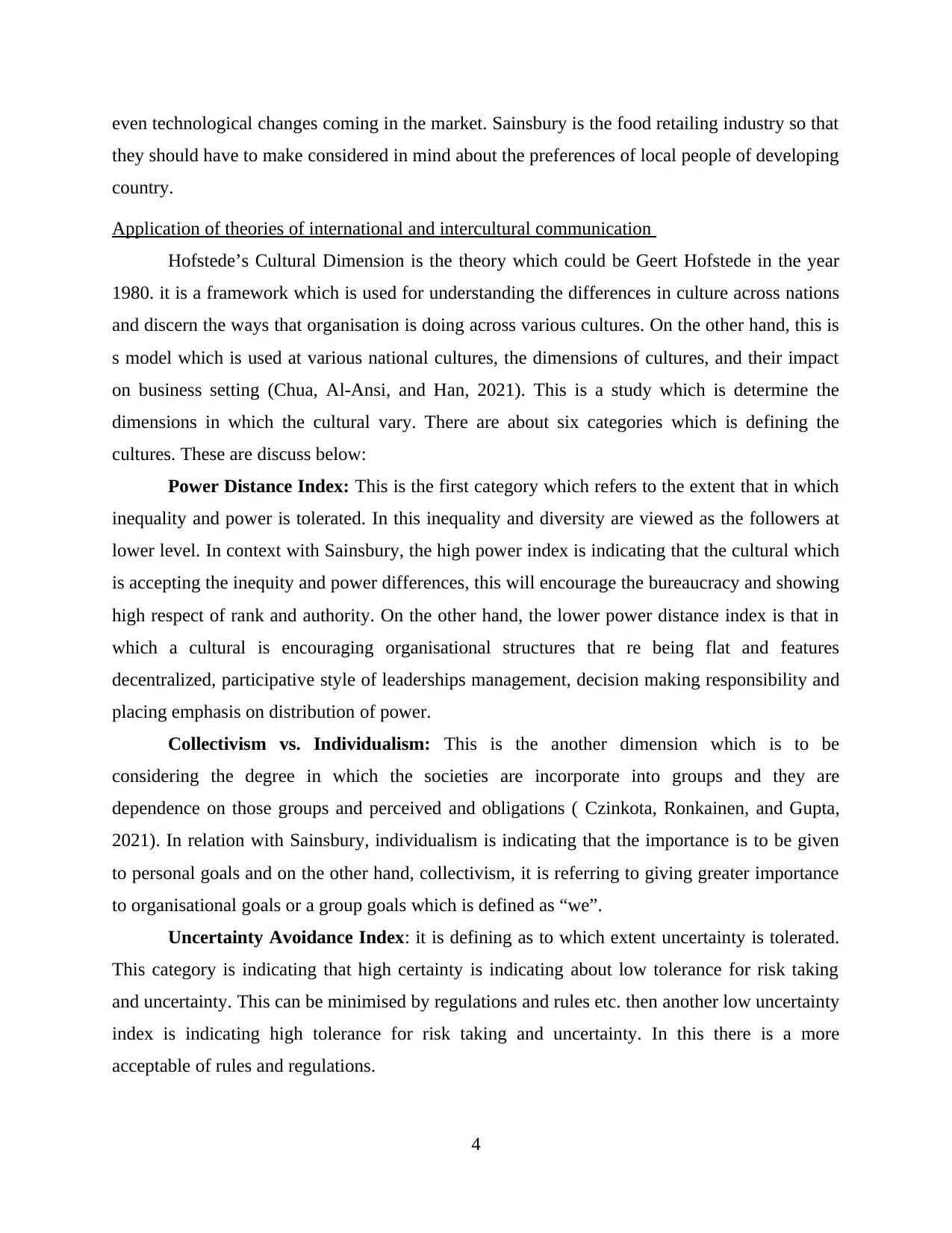
even technological changes coming in the market. Sainsbury is the food retailing industry so that
they should have to make considered in mind about the preferences of local people of developing
country.
Application of theories of international and intercultural communication
Hofstede’s Cultural Dimension is the theory which could be Geert Hofstede in the year
1980. it is a framework which is used for understanding the differences in culture across nations
and discern the ways that organisation is doing across various cultures. On the other hand, this is
s model which is used at various national cultures, the dimensions of cultures, and their impact
on business setting (Chua, Al-Ansi, and Han, 2021). This is a study which is determine the
dimensions in which the cultural vary. There are about six categories which is defining the
cultures. These are discuss below:
Power Distance Index: This is the first category which refers to the extent that in which
inequality and power is tolerated. In this inequality and diversity are viewed as the followers at
lower level. In context with Sainsbury, the high power index is indicating that the cultural which
is accepting the inequity and power differences, this will encourage the bureaucracy and showing
high respect of rank and authority. On the other hand, the lower power distance index is that in
which a cultural is encouraging organisational structures that re being flat and features
decentralized, participative style of leaderships management, decision making responsibility and
placing emphasis on distribution of power.
Collectivism vs. Individualism: This is the another dimension which is to be
considering the degree in which the societies are incorporate into groups and they are
dependence on those groups and perceived and obligations ( Czinkota, Ronkainen, and Gupta,
2021). In relation with Sainsbury, individualism is indicating that the importance is to be given
to personal goals and on the other hand, collectivism, it is referring to giving greater importance
to organisational goals or a group goals which is defined as “we”.
Uncertainty Avoidance Index: it is defining as to which extent uncertainty is tolerated.
This category is indicating that high certainty is indicating about low tolerance for risk taking
and uncertainty. This can be minimised by regulations and rules etc. then another low uncertainty
index is indicating high tolerance for risk taking and uncertainty. In this there is a more
acceptable of rules and regulations.
4
they should have to make considered in mind about the preferences of local people of developing
country.
Application of theories of international and intercultural communication
Hofstede’s Cultural Dimension is the theory which could be Geert Hofstede in the year
1980. it is a framework which is used for understanding the differences in culture across nations
and discern the ways that organisation is doing across various cultures. On the other hand, this is
s model which is used at various national cultures, the dimensions of cultures, and their impact
on business setting (Chua, Al-Ansi, and Han, 2021). This is a study which is determine the
dimensions in which the cultural vary. There are about six categories which is defining the
cultures. These are discuss below:
Power Distance Index: This is the first category which refers to the extent that in which
inequality and power is tolerated. In this inequality and diversity are viewed as the followers at
lower level. In context with Sainsbury, the high power index is indicating that the cultural which
is accepting the inequity and power differences, this will encourage the bureaucracy and showing
high respect of rank and authority. On the other hand, the lower power distance index is that in
which a cultural is encouraging organisational structures that re being flat and features
decentralized, participative style of leaderships management, decision making responsibility and
placing emphasis on distribution of power.
Collectivism vs. Individualism: This is the another dimension which is to be
considering the degree in which the societies are incorporate into groups and they are
dependence on those groups and perceived and obligations ( Czinkota, Ronkainen, and Gupta,
2021). In relation with Sainsbury, individualism is indicating that the importance is to be given
to personal goals and on the other hand, collectivism, it is referring to giving greater importance
to organisational goals or a group goals which is defined as “we”.
Uncertainty Avoidance Index: it is defining as to which extent uncertainty is tolerated.
This category is indicating that high certainty is indicating about low tolerance for risk taking
and uncertainty. This can be minimised by regulations and rules etc. then another low uncertainty
index is indicating high tolerance for risk taking and uncertainty. In this there is a more
acceptable of rules and regulations.
4
Secure Best Marks with AI Grader
Need help grading? Try our AI Grader for instant feedback on your assignments.
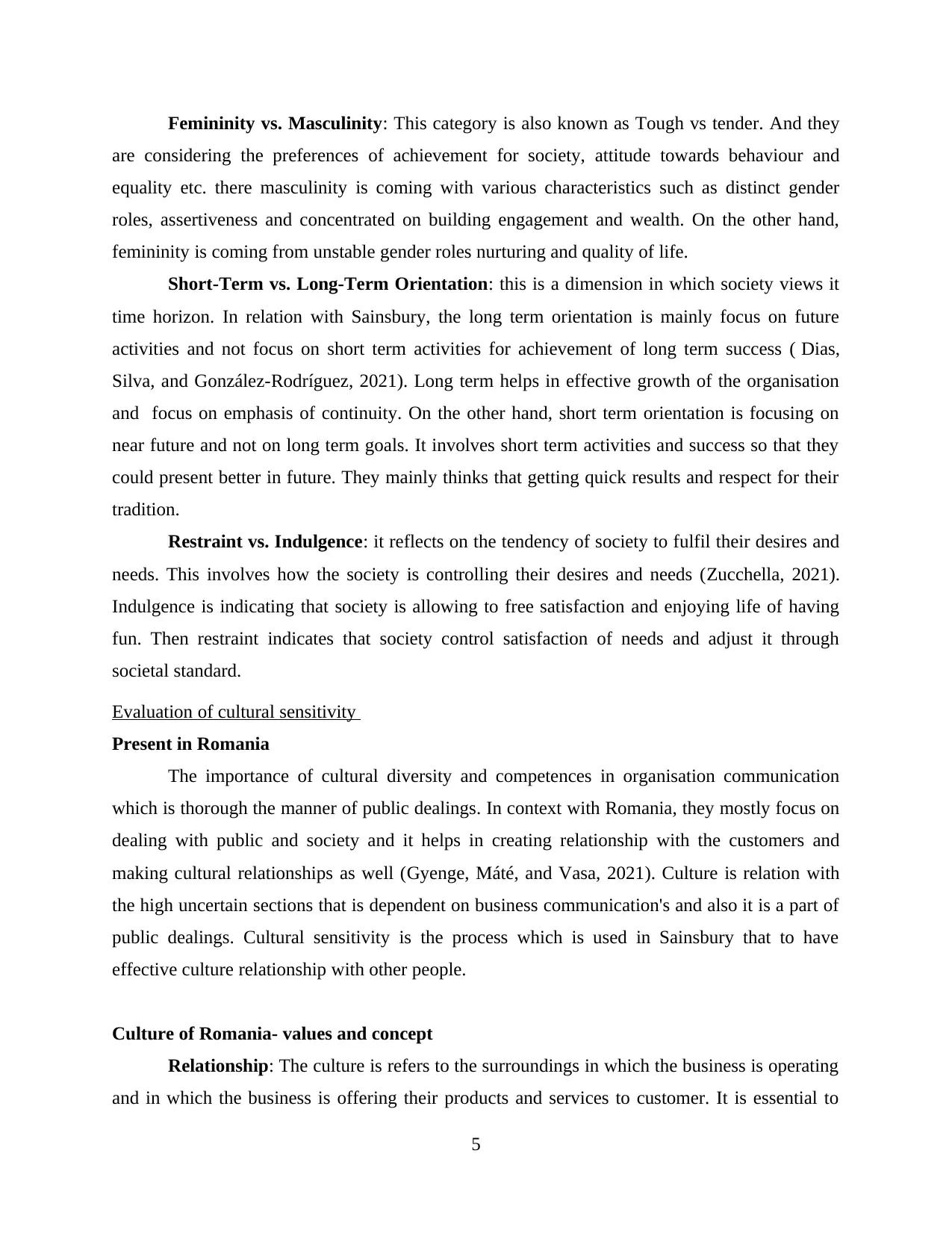
Femininity vs. Masculinity: This category is also known as Tough vs tender. And they
are considering the preferences of achievement for society, attitude towards behaviour and
equality etc. there masculinity is coming with various characteristics such as distinct gender
roles, assertiveness and concentrated on building engagement and wealth. On the other hand,
femininity is coming from unstable gender roles nurturing and quality of life.
Short-Term vs. Long-Term Orientation: this is a dimension in which society views it
time horizon. In relation with Sainsbury, the long term orientation is mainly focus on future
activities and not focus on short term activities for achievement of long term success ( Dias,
Silva, and González-Rodríguez, 2021). Long term helps in effective growth of the organisation
and focus on emphasis of continuity. On the other hand, short term orientation is focusing on
near future and not on long term goals. It involves short term activities and success so that they
could present better in future. They mainly thinks that getting quick results and respect for their
tradition.
Restraint vs. Indulgence: it reflects on the tendency of society to fulfil their desires and
needs. This involves how the society is controlling their desires and needs (Zucchella, 2021).
Indulgence is indicating that society is allowing to free satisfaction and enjoying life of having
fun. Then restraint indicates that society control satisfaction of needs and adjust it through
societal standard.
Evaluation of cultural sensitivity
Present in Romania
The importance of cultural diversity and competences in organisation communication
which is thorough the manner of public dealings. In context with Romania, they mostly focus on
dealing with public and society and it helps in creating relationship with the customers and
making cultural relationships as well (Gyenge, Máté, and Vasa, 2021). Culture is relation with
the high uncertain sections that is dependent on business communication's and also it is a part of
public dealings. Cultural sensitivity is the process which is used in Sainsbury that to have
effective culture relationship with other people.
Culture of Romania- values and concept
Relationship: The culture is refers to the surroundings in which the business is operating
and in which the business is offering their products and services to customer. It is essential to
5
are considering the preferences of achievement for society, attitude towards behaviour and
equality etc. there masculinity is coming with various characteristics such as distinct gender
roles, assertiveness and concentrated on building engagement and wealth. On the other hand,
femininity is coming from unstable gender roles nurturing and quality of life.
Short-Term vs. Long-Term Orientation: this is a dimension in which society views it
time horizon. In relation with Sainsbury, the long term orientation is mainly focus on future
activities and not focus on short term activities for achievement of long term success ( Dias,
Silva, and González-Rodríguez, 2021). Long term helps in effective growth of the organisation
and focus on emphasis of continuity. On the other hand, short term orientation is focusing on
near future and not on long term goals. It involves short term activities and success so that they
could present better in future. They mainly thinks that getting quick results and respect for their
tradition.
Restraint vs. Indulgence: it reflects on the tendency of society to fulfil their desires and
needs. This involves how the society is controlling their desires and needs (Zucchella, 2021).
Indulgence is indicating that society is allowing to free satisfaction and enjoying life of having
fun. Then restraint indicates that society control satisfaction of needs and adjust it through
societal standard.
Evaluation of cultural sensitivity
Present in Romania
The importance of cultural diversity and competences in organisation communication
which is thorough the manner of public dealings. In context with Romania, they mostly focus on
dealing with public and society and it helps in creating relationship with the customers and
making cultural relationships as well (Gyenge, Máté, and Vasa, 2021). Culture is relation with
the high uncertain sections that is dependent on business communication's and also it is a part of
public dealings. Cultural sensitivity is the process which is used in Sainsbury that to have
effective culture relationship with other people.
Culture of Romania- values and concept
Relationship: The culture is refers to the surroundings in which the business is operating
and in which the business is offering their products and services to customer. It is essential to
5
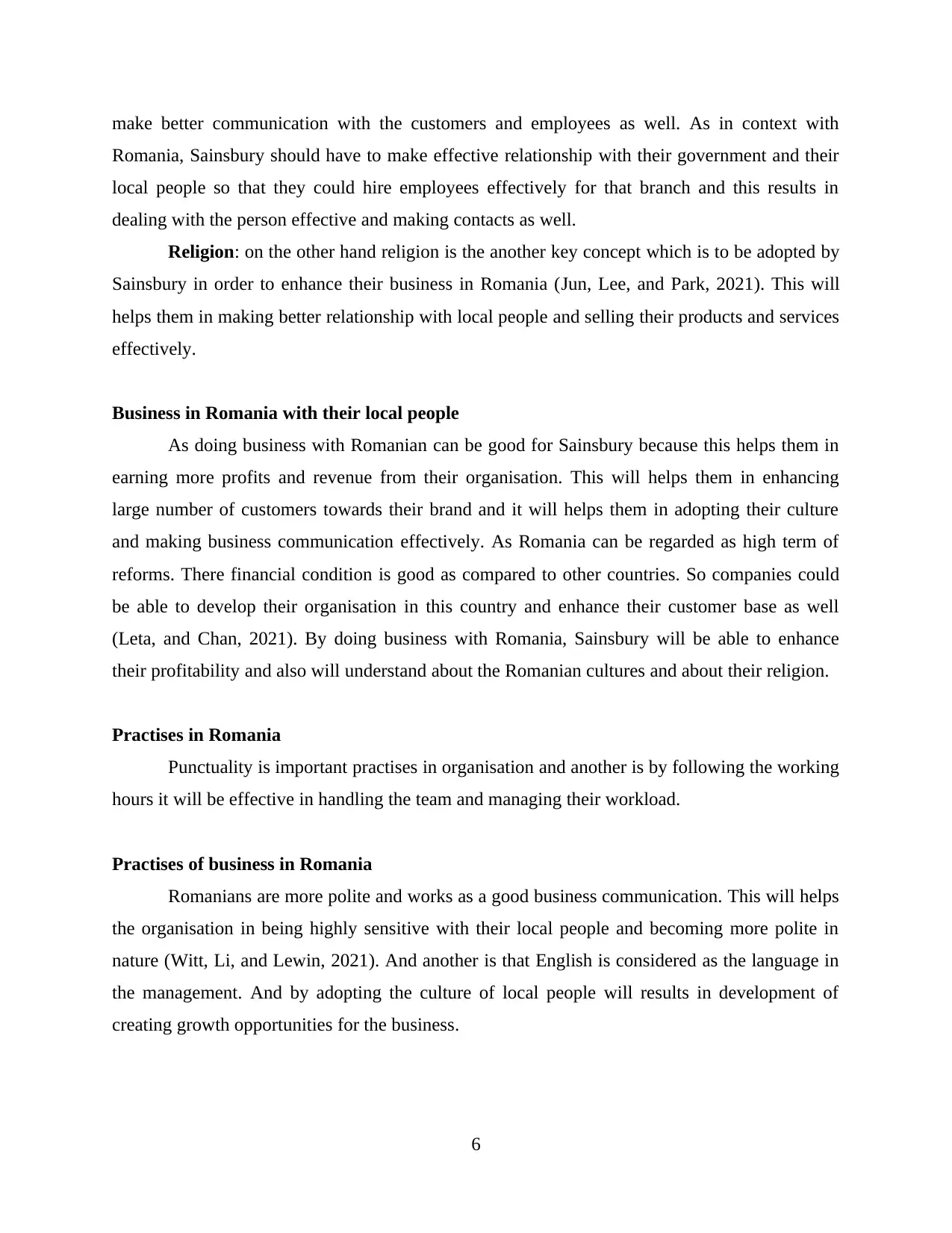
make better communication with the customers and employees as well. As in context with
Romania, Sainsbury should have to make effective relationship with their government and their
local people so that they could hire employees effectively for that branch and this results in
dealing with the person effective and making contacts as well.
Religion: on the other hand religion is the another key concept which is to be adopted by
Sainsbury in order to enhance their business in Romania (Jun, Lee, and Park, 2021). This will
helps them in making better relationship with local people and selling their products and services
effectively.
Business in Romania with their local people
As doing business with Romanian can be good for Sainsbury because this helps them in
earning more profits and revenue from their organisation. This will helps them in enhancing
large number of customers towards their brand and it will helps them in adopting their culture
and making business communication effectively. As Romania can be regarded as high term of
reforms. There financial condition is good as compared to other countries. So companies could
be able to develop their organisation in this country and enhance their customer base as well
(Leta, and Chan, 2021). By doing business with Romania, Sainsbury will be able to enhance
their profitability and also will understand about the Romanian cultures and about their religion.
Practises in Romania
Punctuality is important practises in organisation and another is by following the working
hours it will be effective in handling the team and managing their workload.
Practises of business in Romania
Romanians are more polite and works as a good business communication. This will helps
the organisation in being highly sensitive with their local people and becoming more polite in
nature (Witt, Li, and Lewin, 2021). And another is that English is considered as the language in
the management. And by adopting the culture of local people will results in development of
creating growth opportunities for the business.
6
Romania, Sainsbury should have to make effective relationship with their government and their
local people so that they could hire employees effectively for that branch and this results in
dealing with the person effective and making contacts as well.
Religion: on the other hand religion is the another key concept which is to be adopted by
Sainsbury in order to enhance their business in Romania (Jun, Lee, and Park, 2021). This will
helps them in making better relationship with local people and selling their products and services
effectively.
Business in Romania with their local people
As doing business with Romanian can be good for Sainsbury because this helps them in
earning more profits and revenue from their organisation. This will helps them in enhancing
large number of customers towards their brand and it will helps them in adopting their culture
and making business communication effectively. As Romania can be regarded as high term of
reforms. There financial condition is good as compared to other countries. So companies could
be able to develop their organisation in this country and enhance their customer base as well
(Leta, and Chan, 2021). By doing business with Romania, Sainsbury will be able to enhance
their profitability and also will understand about the Romanian cultures and about their religion.
Practises in Romania
Punctuality is important practises in organisation and another is by following the working
hours it will be effective in handling the team and managing their workload.
Practises of business in Romania
Romanians are more polite and works as a good business communication. This will helps
the organisation in being highly sensitive with their local people and becoming more polite in
nature (Witt, Li, and Lewin, 2021). And another is that English is considered as the language in
the management. And by adopting the culture of local people will results in development of
creating growth opportunities for the business.
6
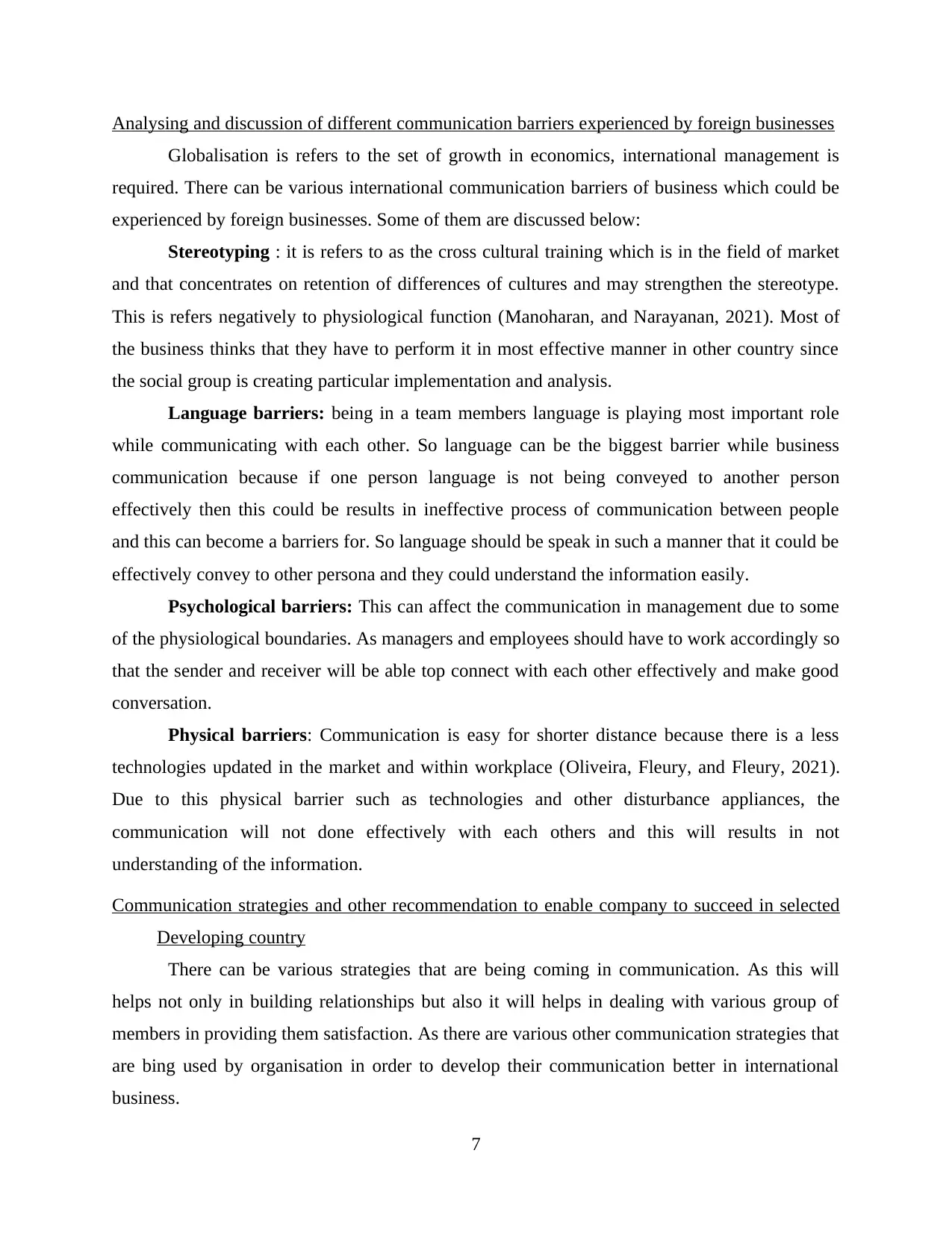
Analysing and discussion of different communication barriers experienced by foreign businesses
Globalisation is refers to the set of growth in economics, international management is
required. There can be various international communication barriers of business which could be
experienced by foreign businesses. Some of them are discussed below:
Stereotyping : it is refers to as the cross cultural training which is in the field of market
and that concentrates on retention of differences of cultures and may strengthen the stereotype.
This is refers negatively to physiological function (Manoharan, and Narayanan, 2021). Most of
the business thinks that they have to perform it in most effective manner in other country since
the social group is creating particular implementation and analysis.
Language barriers: being in a team members language is playing most important role
while communicating with each other. So language can be the biggest barrier while business
communication because if one person language is not being conveyed to another person
effectively then this could be results in ineffective process of communication between people
and this can become a barriers for. So language should be speak in such a manner that it could be
effectively convey to other persona and they could understand the information easily.
Psychological barriers: This can affect the communication in management due to some
of the physiological boundaries. As managers and employees should have to work accordingly so
that the sender and receiver will be able top connect with each other effectively and make good
conversation.
Physical barriers: Communication is easy for shorter distance because there is a less
technologies updated in the market and within workplace (Oliveira, Fleury, and Fleury, 2021).
Due to this physical barrier such as technologies and other disturbance appliances, the
communication will not done effectively with each others and this will results in not
understanding of the information.
Communication strategies and other recommendation to enable company to succeed in selected
Developing country
There can be various strategies that are being coming in communication. As this will
helps not only in building relationships but also it will helps in dealing with various group of
members in providing them satisfaction. As there are various other communication strategies that
are bing used by organisation in order to develop their communication better in international
business.
7
Globalisation is refers to the set of growth in economics, international management is
required. There can be various international communication barriers of business which could be
experienced by foreign businesses. Some of them are discussed below:
Stereotyping : it is refers to as the cross cultural training which is in the field of market
and that concentrates on retention of differences of cultures and may strengthen the stereotype.
This is refers negatively to physiological function (Manoharan, and Narayanan, 2021). Most of
the business thinks that they have to perform it in most effective manner in other country since
the social group is creating particular implementation and analysis.
Language barriers: being in a team members language is playing most important role
while communicating with each other. So language can be the biggest barrier while business
communication because if one person language is not being conveyed to another person
effectively then this could be results in ineffective process of communication between people
and this can become a barriers for. So language should be speak in such a manner that it could be
effectively convey to other persona and they could understand the information easily.
Psychological barriers: This can affect the communication in management due to some
of the physiological boundaries. As managers and employees should have to work accordingly so
that the sender and receiver will be able top connect with each other effectively and make good
conversation.
Physical barriers: Communication is easy for shorter distance because there is a less
technologies updated in the market and within workplace (Oliveira, Fleury, and Fleury, 2021).
Due to this physical barrier such as technologies and other disturbance appliances, the
communication will not done effectively with each others and this will results in not
understanding of the information.
Communication strategies and other recommendation to enable company to succeed in selected
Developing country
There can be various strategies that are being coming in communication. As this will
helps not only in building relationships but also it will helps in dealing with various group of
members in providing them satisfaction. As there are various other communication strategies that
are bing used by organisation in order to develop their communication better in international
business.
7
Paraphrase This Document
Need a fresh take? Get an instant paraphrase of this document with our AI Paraphraser
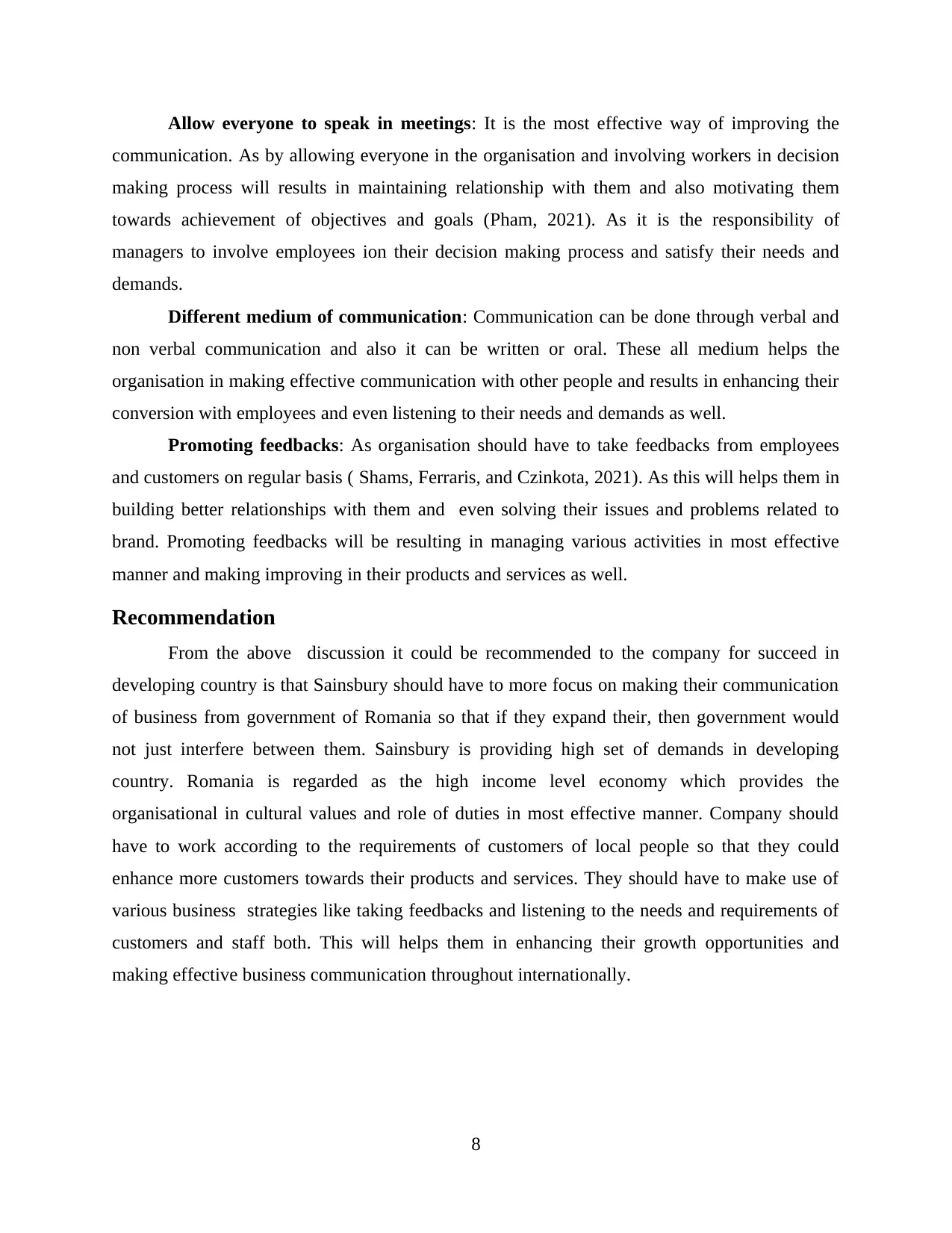
Allow everyone to speak in meetings: It is the most effective way of improving the
communication. As by allowing everyone in the organisation and involving workers in decision
making process will results in maintaining relationship with them and also motivating them
towards achievement of objectives and goals (Pham, 2021). As it is the responsibility of
managers to involve employees ion their decision making process and satisfy their needs and
demands.
Different medium of communication: Communication can be done through verbal and
non verbal communication and also it can be written or oral. These all medium helps the
organisation in making effective communication with other people and results in enhancing their
conversion with employees and even listening to their needs and demands as well.
Promoting feedbacks: As organisation should have to take feedbacks from employees
and customers on regular basis ( Shams, Ferraris, and Czinkota, 2021). As this will helps them in
building better relationships with them and even solving their issues and problems related to
brand. Promoting feedbacks will be resulting in managing various activities in most effective
manner and making improving in their products and services as well.
Recommendation
From the above discussion it could be recommended to the company for succeed in
developing country is that Sainsbury should have to more focus on making their communication
of business from government of Romania so that if they expand their, then government would
not just interfere between them. Sainsbury is providing high set of demands in developing
country. Romania is regarded as the high income level economy which provides the
organisational in cultural values and role of duties in most effective manner. Company should
have to work according to the requirements of customers of local people so that they could
enhance more customers towards their products and services. They should have to make use of
various business strategies like taking feedbacks and listening to the needs and requirements of
customers and staff both. This will helps them in enhancing their growth opportunities and
making effective business communication throughout internationally.
8
communication. As by allowing everyone in the organisation and involving workers in decision
making process will results in maintaining relationship with them and also motivating them
towards achievement of objectives and goals (Pham, 2021). As it is the responsibility of
managers to involve employees ion their decision making process and satisfy their needs and
demands.
Different medium of communication: Communication can be done through verbal and
non verbal communication and also it can be written or oral. These all medium helps the
organisation in making effective communication with other people and results in enhancing their
conversion with employees and even listening to their needs and demands as well.
Promoting feedbacks: As organisation should have to take feedbacks from employees
and customers on regular basis ( Shams, Ferraris, and Czinkota, 2021). As this will helps them in
building better relationships with them and even solving their issues and problems related to
brand. Promoting feedbacks will be resulting in managing various activities in most effective
manner and making improving in their products and services as well.
Recommendation
From the above discussion it could be recommended to the company for succeed in
developing country is that Sainsbury should have to more focus on making their communication
of business from government of Romania so that if they expand their, then government would
not just interfere between them. Sainsbury is providing high set of demands in developing
country. Romania is regarded as the high income level economy which provides the
organisational in cultural values and role of duties in most effective manner. Company should
have to work according to the requirements of customers of local people so that they could
enhance more customers towards their products and services. They should have to make use of
various business strategies like taking feedbacks and listening to the needs and requirements of
customers and staff both. This will helps them in enhancing their growth opportunities and
making effective business communication throughout internationally.
8
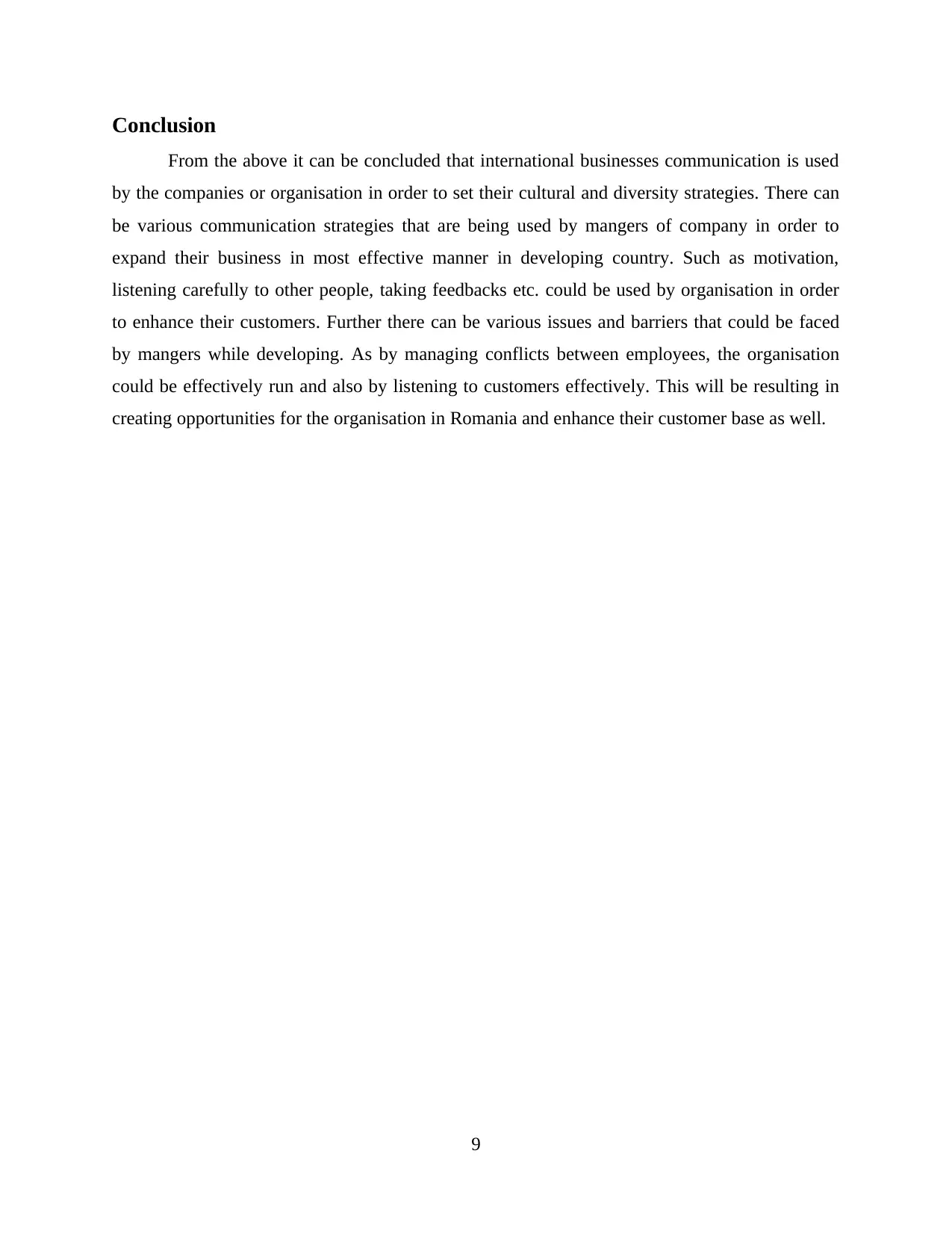
Conclusion
From the above it can be concluded that international businesses communication is used
by the companies or organisation in order to set their cultural and diversity strategies. There can
be various communication strategies that are being used by mangers of company in order to
expand their business in most effective manner in developing country. Such as motivation,
listening carefully to other people, taking feedbacks etc. could be used by organisation in order
to enhance their customers. Further there can be various issues and barriers that could be faced
by mangers while developing. As by managing conflicts between employees, the organisation
could be effectively run and also by listening to customers effectively. This will be resulting in
creating opportunities for the organisation in Romania and enhance their customer base as well.
9
From the above it can be concluded that international businesses communication is used
by the companies or organisation in order to set their cultural and diversity strategies. There can
be various communication strategies that are being used by mangers of company in order to
expand their business in most effective manner in developing country. Such as motivation,
listening carefully to other people, taking feedbacks etc. could be used by organisation in order
to enhance their customers. Further there can be various issues and barriers that could be faced
by mangers while developing. As by managing conflicts between employees, the organisation
could be effectively run and also by listening to customers effectively. This will be resulting in
creating opportunities for the organisation in Romania and enhance their customer base as well.
9
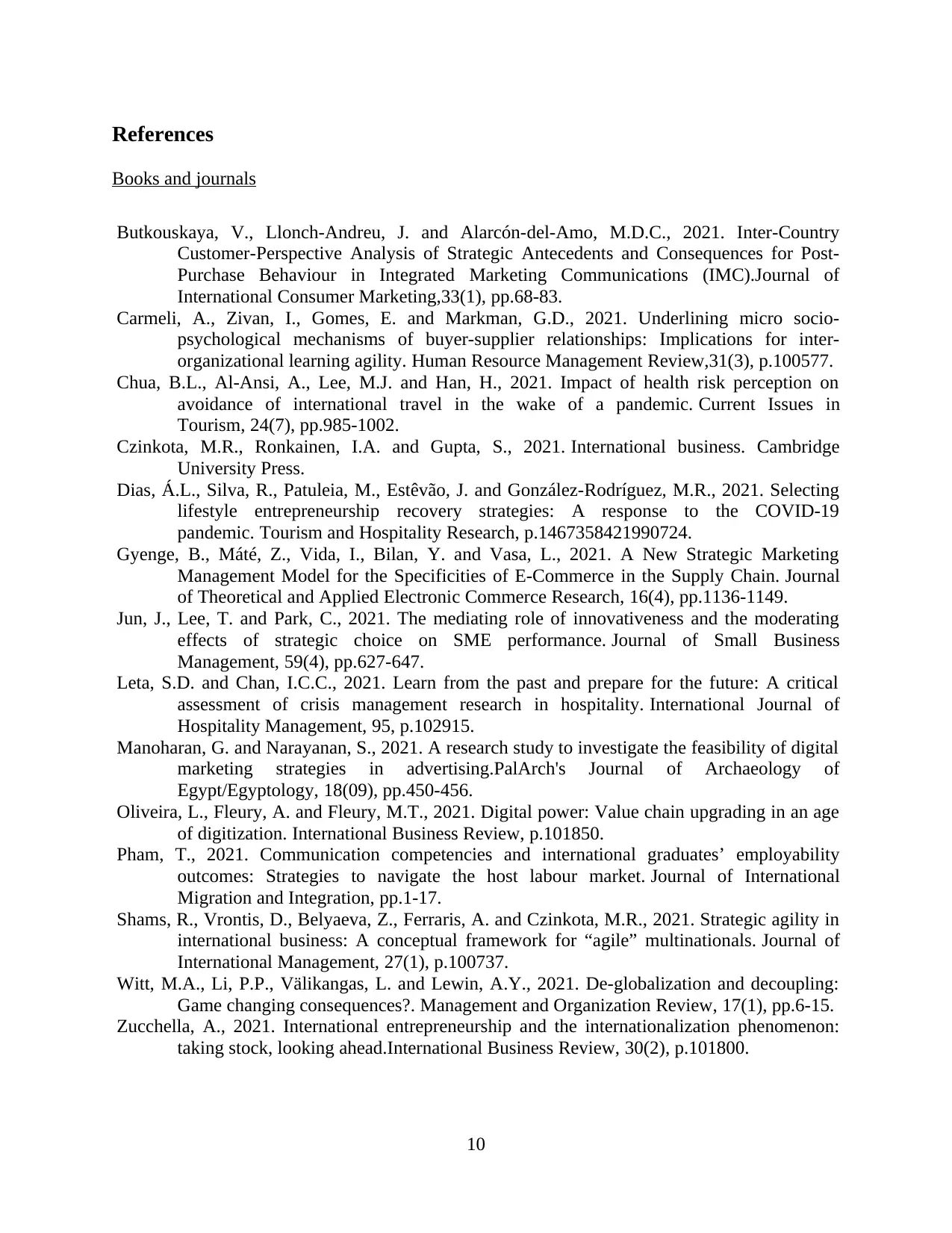
References
Books and journals
Butkouskaya, V., Llonch-Andreu, J. and Alarcón-del-Amo, M.D.C., 2021. Inter-Country
Customer-Perspective Analysis of Strategic Antecedents and Consequences for Post-
Purchase Behaviour in Integrated Marketing Communications (IMC).Journal of
International Consumer Marketing,33(1), pp.68-83.
Carmeli, A., Zivan, I., Gomes, E. and Markman, G.D., 2021. Underlining micro socio-
psychological mechanisms of buyer-supplier relationships: Implications for inter-
organizational learning agility. Human Resource Management Review,31(3), p.100577.
Chua, B.L., Al-Ansi, A., Lee, M.J. and Han, H., 2021. Impact of health risk perception on
avoidance of international travel in the wake of a pandemic. Current Issues in
Tourism, 24(7), pp.985-1002.
Czinkota, M.R., Ronkainen, I.A. and Gupta, S., 2021. International business. Cambridge
University Press.
Dias, Á.L., Silva, R., Patuleia, M., Estêvão, J. and González-Rodríguez, M.R., 2021. Selecting
lifestyle entrepreneurship recovery strategies: A response to the COVID-19
pandemic. Tourism and Hospitality Research, p.1467358421990724.
Gyenge, B., Máté, Z., Vida, I., Bilan, Y. and Vasa, L., 2021. A New Strategic Marketing
Management Model for the Specificities of E-Commerce in the Supply Chain. Journal
of Theoretical and Applied Electronic Commerce Research, 16(4), pp.1136-1149.
Jun, J., Lee, T. and Park, C., 2021. The mediating role of innovativeness and the moderating
effects of strategic choice on SME performance. Journal of Small Business
Management, 59(4), pp.627-647.
Leta, S.D. and Chan, I.C.C., 2021. Learn from the past and prepare for the future: A critical
assessment of crisis management research in hospitality. International Journal of
Hospitality Management, 95, p.102915.
Manoharan, G. and Narayanan, S., 2021. A research study to investigate the feasibility of digital
marketing strategies in advertising.PalArch's Journal of Archaeology of
Egypt/Egyptology, 18(09), pp.450-456.
Oliveira, L., Fleury, A. and Fleury, M.T., 2021. Digital power: Value chain upgrading in an age
of digitization. International Business Review, p.101850.
Pham, T., 2021. Communication competencies and international graduates’ employability
outcomes: Strategies to navigate the host labour market. Journal of International
Migration and Integration, pp.1-17.
Shams, R., Vrontis, D., Belyaeva, Z., Ferraris, A. and Czinkota, M.R., 2021. Strategic agility in
international business: A conceptual framework for “agile” multinationals. Journal of
International Management, 27(1), p.100737.
Witt, M.A., Li, P.P., Välikangas, L. and Lewin, A.Y., 2021. De-globalization and decoupling:
Game changing consequences?. Management and Organization Review, 17(1), pp.6-15.
Zucchella, A., 2021. International entrepreneurship and the internationalization phenomenon:
taking stock, looking ahead.International Business Review, 30(2), p.101800.
10
Books and journals
Butkouskaya, V., Llonch-Andreu, J. and Alarcón-del-Amo, M.D.C., 2021. Inter-Country
Customer-Perspective Analysis of Strategic Antecedents and Consequences for Post-
Purchase Behaviour in Integrated Marketing Communications (IMC).Journal of
International Consumer Marketing,33(1), pp.68-83.
Carmeli, A., Zivan, I., Gomes, E. and Markman, G.D., 2021. Underlining micro socio-
psychological mechanisms of buyer-supplier relationships: Implications for inter-
organizational learning agility. Human Resource Management Review,31(3), p.100577.
Chua, B.L., Al-Ansi, A., Lee, M.J. and Han, H., 2021. Impact of health risk perception on
avoidance of international travel in the wake of a pandemic. Current Issues in
Tourism, 24(7), pp.985-1002.
Czinkota, M.R., Ronkainen, I.A. and Gupta, S., 2021. International business. Cambridge
University Press.
Dias, Á.L., Silva, R., Patuleia, M., Estêvão, J. and González-Rodríguez, M.R., 2021. Selecting
lifestyle entrepreneurship recovery strategies: A response to the COVID-19
pandemic. Tourism and Hospitality Research, p.1467358421990724.
Gyenge, B., Máté, Z., Vida, I., Bilan, Y. and Vasa, L., 2021. A New Strategic Marketing
Management Model for the Specificities of E-Commerce in the Supply Chain. Journal
of Theoretical and Applied Electronic Commerce Research, 16(4), pp.1136-1149.
Jun, J., Lee, T. and Park, C., 2021. The mediating role of innovativeness and the moderating
effects of strategic choice on SME performance. Journal of Small Business
Management, 59(4), pp.627-647.
Leta, S.D. and Chan, I.C.C., 2021. Learn from the past and prepare for the future: A critical
assessment of crisis management research in hospitality. International Journal of
Hospitality Management, 95, p.102915.
Manoharan, G. and Narayanan, S., 2021. A research study to investigate the feasibility of digital
marketing strategies in advertising.PalArch's Journal of Archaeology of
Egypt/Egyptology, 18(09), pp.450-456.
Oliveira, L., Fleury, A. and Fleury, M.T., 2021. Digital power: Value chain upgrading in an age
of digitization. International Business Review, p.101850.
Pham, T., 2021. Communication competencies and international graduates’ employability
outcomes: Strategies to navigate the host labour market. Journal of International
Migration and Integration, pp.1-17.
Shams, R., Vrontis, D., Belyaeva, Z., Ferraris, A. and Czinkota, M.R., 2021. Strategic agility in
international business: A conceptual framework for “agile” multinationals. Journal of
International Management, 27(1), p.100737.
Witt, M.A., Li, P.P., Välikangas, L. and Lewin, A.Y., 2021. De-globalization and decoupling:
Game changing consequences?. Management and Organization Review, 17(1), pp.6-15.
Zucchella, A., 2021. International entrepreneurship and the internationalization phenomenon:
taking stock, looking ahead.International Business Review, 30(2), p.101800.
10
1 out of 10
Related Documents
Your All-in-One AI-Powered Toolkit for Academic Success.
+13062052269
info@desklib.com
Available 24*7 on WhatsApp / Email
![[object Object]](/_next/static/media/star-bottom.7253800d.svg)
Unlock your academic potential
© 2024 | Zucol Services PVT LTD | All rights reserved.




